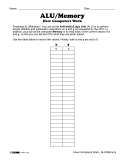I added an extra slide to include a diagram of a ripple carry adder.
Slides are available in the following formats:
- OpenDocument (.odp) 945K
- PDF 448K
- PowerPoint (.ppt) 1409K
(or Computer Science Education for K-12, whichever you prefer)
 |  |  |
How can we better prepare our children for life in a high-technology society? How early should we teach them computer and pre-programming skills? How can we integrate computer science education into Montessori classrooms? This presentation of Montessori-friendly and age-appropriate activities will include stand-alone activities and extensions to existing classroom curricula as well as a take-home list of some useful online resources for teachers.
Why aren't we teaching pre-programming skills (binary, boolean logic, transistors) to our children during elementary school? Why don't we teach students how computers actually work instead of simply how to use them? In this workshop, we will show (1) how computers work and (2) how you can teach these concepts to your elementary/middle school classroom.